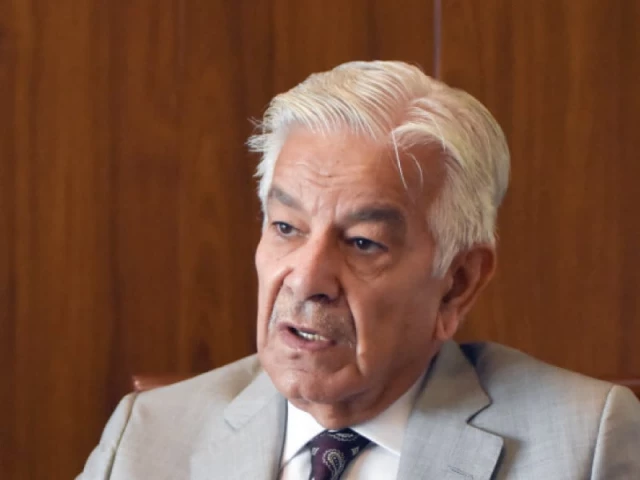The minister describes the Kabul regime as India’s proxy; Questions the legitimacy of the Taliban government
ISLAMABAD:
Defense Minister Khawaja Asif issued Pakistan’s strongest warning to the Taliban regime on Wednesday, saying Islamabad would not hesitate to strike “deep into Afghanistan” if Kabul failed to contain militants using its soil for attacks across the border.
The warning, the harshest since the collapse of the Istanbul peace talks, marks a decisive hardening of Islamabad’s stance after weeks of what officials described as breathless patience. Last-ditch efforts, brokered by Turkey and Qatar, failed in the face of Afghan escapes and a stubborn refusal to guarantee that its soil would not be used for aggression, sources revealed earlier.
“We will carry out strikes, we certainly will,” Asif told reporters in Parliament. “If their territory is used and they violate our territory, then if we have to go deep into Afghanistan to retaliate, we surely will.”
Asif said that although Pakistan approached the negotiations with sincerity, the Afghan side seemed determined to be obstructive. “Kabul was not sincere at any level in favor of any arrangement. Following India’s directives and becoming its proxy, Fitna al-Hindustan wants to leverage its position over Pakistan through Afghanistan,” he said.
“The entire leadership in Kabul is playing into India’s hands.”
According to Asif, working groups from both sides had almost reached consensus on several occasions before Afghan delegates abruptly withdrew under instructions from Kabul. “Time and again, every time something was finalized and an agreement was drawn up – this happened three or four times, I think – they contacted Kabul and a ‘no’ came from Kabul, because of which we could not reach an agreement with them,” he said.
He warned that if Afghan leaders had “chosen the path of confrontation, so be it”.
Asif said Taliban negotiators had verbally admitted that the banned Tehreek-e-Taliban Pakistan (TTP) was operating from Afghan soil, but refused to put that commitment in writing. “They agreed on everything but were not ready to give in in writing,” he said.
When asked if the inclusion of TTP representatives in future negotiations was being considered, Asif replied: “Even if they had said so, it would have been a complete refusal on our part.”
He added that even the mediators – Qatar and Turkey – had now recognized the “futoor (infirmity)” in Kabul’s intentions.
“We have made this attempt with all sincerity so that Pakistan and Afghanistan can live peacefully as good neighbors. But if they have handed over the reins to Delhi, then it will be difficult,” he said. Asked if he still saw room for reason, he replied: “One can only pray, [but] There are no medications.”
Asif also questioned the very legitimacy of the Taliban government, saying it lacked international recognition and control over its own territory.
“This government does not have its power in the whole of Afghanistan. Afghanistan is practically broken into pieces, where one or another influential terrorist group… there is a congregation of international terrorism there,” he said.
He added that Afghanistan does not “meet the definition of a state” and does not act as one. “They are the ones involved in the killings, and they benefit financially from being in power.”
Asked if the situation was moving toward a new Tora Bora-style confrontation, he said: “It’s certainly a possibility.”
Earlier in the day, Asif had issued a searing warning to Kabul on social media, warning that Taliban leaders would “test Islamabad’s resolve at their peril.”
“We have put up with your betrayal and mockery for too long, but no more. Any terrorist attack or suicide bombing inside Pakistan will give you the bitter taste of such misadventures. Rest assured and test our resolve and capabilities, if you wish, at your own risk,” he posted on X.
The minister said that Pakistan had started negotiations “to give peace a chance” at the request of “brotherly countries”, but that “the venomous statements of some Afghan officials clearly reflect the devious and divided state of mind of the country”. [the] Taliban regime.”
“Let me assure them that Pakistan does not need to use even a fraction of its full arsenal to completely annihilate the Taliban regime and push them back into the caves to hide. If they wish, a repeat of the scenes of their rout at Tora Bora, tail between their legs, would surely be a sight to watch for the people of the region,” he wrote.
Accusing the Taliban of “blindly pushing Afghanistan into yet another conflict,” Asif said they sought to preserve their “usurped regime and war economy.”
“Although they are fully aware of their inherent limitations and the hollowness of their war cries, they beat the drums of war to maintain their crumbling facade. If the Afghan Taliban regime is dead set on ruining Afghanistan and its innocent people once again, so be it,” he added.
Referring to the oft-quoted phrase ‘graveyard of empires’, Asif said: “Pakistan certainly does not claim to be an empire, but Afghanistan is definitely a graveyard, surely for its own people.” Never a graveyard of empires but certainly a playground of empires that you have been throughout history.”
He warned “Taliban regime warmongers” that Pakistan’s restraint should not be mistaken for weakness. “If the Taliban regime wants to fight us, the world will see Insha Allah (God willing) that their threats are nothing but a performative circus!” he said.
The United Nations
Meanwhile, the United Nations has expressed concern over the failure of Pakistan-Afghanistan talks, urging both sides to avoid a resumption of conflict.
“Yes, of course. We very much hope that even if the negotiations are suspended, the fighting will not resume,” UN spokesperson Stéphane Dujarric said during a regular press briefing at the UN headquarters in New York, according to APP.




